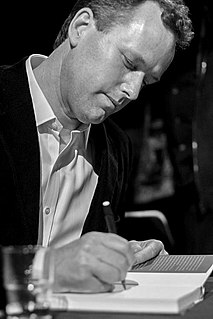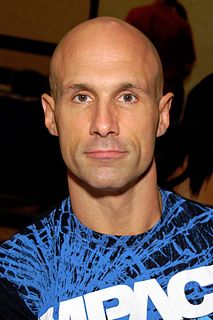A Quote by Edward St Aubyn
The thing about the 'Melrose' novels is that I have to feel they're impossible when I set out.
Related Quotes
I was on 'Melrose' at a time where we had to all go home and be there at the same time when the show was on, or set your VCR. But that was a big thing, and people of my generation still talk about that. They remember where they were, at what point of their lives that show came, and then talking about it the next day.
It's a sense of pride, a sense of you set out to get a record deal, and we got that. We set out to get a No. 1 record, and then we got that. Then you say, 'Wow, that was impossible and now even more impossible is to stay No. 1 and stay current and put out new records that people care about,' and we really stuck to that.
One set at extreme intensity does the muscle-building job. It must be stressed that the one final, all-out set I do takes me to the very limit of my capabilities. If you feel you can attempt a second set, then you couldn’t have been pulling out all the stops during the first set. It's not pretty, but it works.
In Pakistan, many of the young people read novels because in the novels, not just my novels but the novels of many other Pakistani writers, they encounter ideas, notions, ways of thinking about the world, thinking about their society that are different. And fiction functions in a countercultural way as it does in America and certainly as it did in the, you know, '60s.
Everything mattered and nothing did, and I was tired of trying to find out how both of those things were true. I was an itch that I'd scratched so hard I was bleeding. I had set out to do the impossible, whatever the impossible might be, only to find out that it was living with myself. Suicide became an expiration date, the day after which I no longer had to try.
When you will, make a resolution, set your jaw, you are expressing an imaginative fear that you won't do the thing. If you knew you would do the thing, you would smile happily and set about it. And this fear (since the imagination is always creative) comes about presently and you slide down into the complete slump of several weeks or years - the very thing you dreaded and set your jaw against.
I've been thinking a lot about why it was so important to me to do The Idiot as a novel, and not a memoir. One reason is the great love of novels that I keep droning on about. I've always loved reading novels. I've wanted to write novels since I was little. I started my first novel when I was seven.I don't have the same connection to memoir or nonfiction or essays. Writing nonfiction makes me feel a little bit as if I'm producing a product I don't consume - it's a really alienating feeling.


































